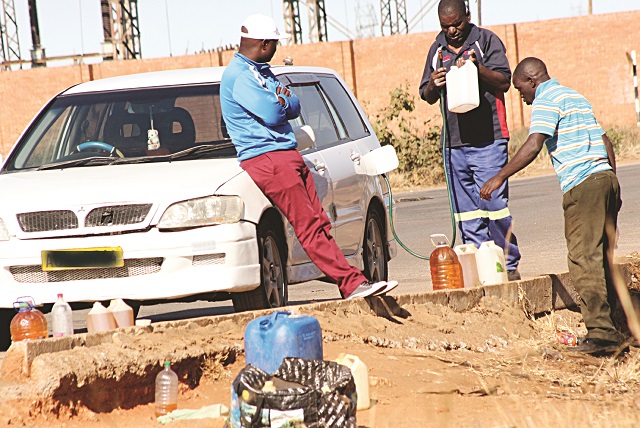Zera engages RBZ to end fuel crisis
By Blessings Mashaya
In the wake of the increased demand for fuel, industry actors are engaging the Reserve Bank of Zimbabwe (RBZ) to review the amount of foreign currency allocated to the petroleum sector.

This was revealed by the chief executive officer of the Zimbabwe Energy Regulatory Authority (Zera), Gloria Magombo.
She told the Daily News yesterday that Zera, the ministry of Energy and Power Development, and the oil industry players were in discussions with the RBZ “to ensure availability of sufficient foreign currency for fuel procurement”.
Until September last year, the central bank had been allocating $7 million per week to fuel importers; increasing the amount to $10 million weekly, thereafter.
Notwithstanding, the demand for fuel has increased significantly, also affecting supply demand balance since the coming in of the new dispensation last November.
Zera estimates that the demand for petrol has gone up by over 20 percent and that of diesel by over eight percent in the first quarter of 2018, as compared to the same period last year.
Magombo told the Daily News yesterday that Zera continues to monitor the market and notes that there has been sporadic stock out at some sites.
“But (we) wish to reiterate that fuel is available in the market albeit not at the same time,” she said.
“Zera wish to assure the nation that a team of officers is on the ground monitoring the situation and will continue to advise stakeholders of measures being taken to ensure supply of sufficient stock in the country. Consumers are urged not to panic buy and should desist from stocking fuel at home as that pose dangers of fire and the risk of perpetuating an artificial shortage which is cyclic.The public is urged to alert Zera of any fuel price deviation as oil industry players are informed of the regulated fuel price on a weekly basis,” she said.
This comes as service stations in most parts of the country are still struggling to secure adequate fuel to meet demand, resulting in long-winding queues at pump stations with the product in stock.
Recently, Energy and Power Development minister Simon Khaya Moyo said RBZ has been allocating money for fuel importation to oil companies at an average rate of $10 million a week, without heeding the adjustments in demand.
The increasing prices of fuel at pump stations is also a result of a global rise in crude oil prices and the fact that at present, the country had suspended ethanol blending, which helps suppress costs.
Global oil prices soared over the past week owing to disturbances in the Middle East.
The United States, France and Britain — members of the North Atlantic Treaty Organisation — launched 105 missiles on Syria on Saturday, targeting what they called were Syria’s chemical weapons facilities.
Syrian President Bashar Hafez al-Assad’s administration is being accused of using chemical weapons to eliminate opponents in a deadly civil war which has been ravaging the key oil producing nation for the past six years.
Confederation of Zimbabwe Industries president Sifelani Jabangwe told the Daily News on Tuesday that industry has been negatively affected by the shortages.
“As industry, we are losing a bit of time in queues but the fuel is there and we know the problem is coming from (increased demand); it’s an indication of growth. The amount of fuel which was adequate previously is no longer adequate now, which means there is economic growth,” Jabangwe said, while calling on the RBZ to increase the amount of foreign currency allocated towards fuel imports.
RBZ governor, John Mangudya has previously told the Daily News that the apex bank was allocating enough foreign currency to the industry.
He went further to state that unless Zimbabwe reaches a point when it is able to export more goods and services in order to increase its foreign currency earnings, the foreign currency problems would persist.
“The only sustainable way of dealing with shortages is to increase the supply of forex to meet demand. This entails increasing production, productivity and exports. It is because forex is such a critical resource that we have put measures to incentivise the export of goods and services and remittances,” he said.
“Fuel companies do not export and we get fuel from our weekly minerals. So when they export, we know there is money for fuel,” he added.
Liquid fuels constitute 18 percent of the total national energy requirements in the country, with annual imports of petrol and diesel amounting to 540 million and 630 million litres respectively.
At peak around 2014/15, the economy had the capacity to consume three million litres of diesel and two million litres of petrol per day.
This translated to over one billion litres of diesel and 730 million litres of petrol, official figures indicate.
Despite these shortages, fuel remains one of government’s key sources of revenue.
Diesel, for instance, is charged taxes and levies amounting to 0,50 cents per litre and these include duty, Zimbabwe National Road Administration road levy, carbon tax, debt redemption, strategic reserve levy and the NocZim debt levy. DailyNews






